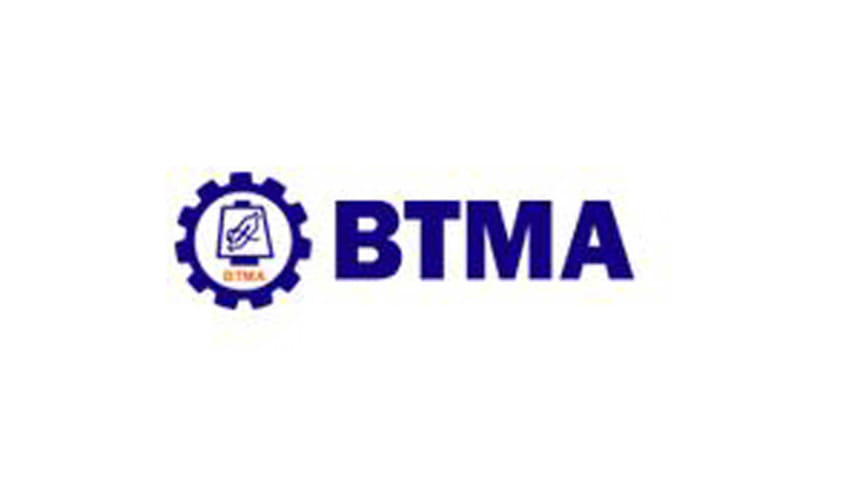BTMA demands drives against sales of illegally imported yarn

Bangladesh Textile Mills Association (BTMA), a platform of primary textile millers, yesterday urged the National Board of Revenue (NBR) to enhance monitoring in markets across the country against the sale of illegally imported yarn.
In a letter sent to NBR Chairman Abu Hena Md Rahmatul Muneem, the BTMA said there were massive stockpiles of locally-made yarn in markets of Narayanganj, Araihazar, Gausia, Madhabdi, Baburhaat, Narsingdi, Tangail, Sirajganj, Belkuchi and Pabna.
But illegally imported yarn is being sold at a rate cheaper than those produced locally, resulting in a lot of losses and liquidity crisis for local spinners catering to the domestic market, it said.
Customs Bond Commissionerate usually conducts drives against the malpractice on the NBR's instructions and from time to time has seized a lot of illegally imported yarn, meaning those brought in through false declarations.
However, such drives have remained suspended over the last couple of years, said the BTMA.
The local stockpile of yarn used in the production of fabrics for the local market is worth Tk 8,000 crore
In another letter, the BTMA urged the NBR to formulate a policy which would stipulate that export-oriented garment factories first use up yarn available from local spinners before meeting any shortages through imports.
The export-oriented garment factories import a lot of yarn with US dollars using the bonded warehouse facility, for which the demand for the locally-made yarn falls.
However, the value addition in the use of local yarn is 55 per cent to 60 per cent whereas of imported yarn 30 per cent, said the BTMA.
Currently, there are 510 spinning mills in the country with an annual production capacity of 3,600 million kilogrammes (kgs), which can meet 70 per cent of the demand of the export-oriented garment factories.
Ensuring the use of the local yarn will require the export-oriented garment factories to open back-to-back letters of credit, the first by using the order placed by the buyer and the second for the import of yarn, said the BTMA.
This will save the local primary textile sector and reduce use of the US dollar in this period of crisis, it said.
The local textile sector has been facing the severe impacts of the Russia-Ukraine war because of the dollar crisis and abnormal hikes in energy prices, which goes on to raise the cost of production, said the BTMA.
However, the price of yarn and garments did not increase in tune with the rise in the cost of production while the inflow of work orders from international clothing retailers and brands has also fallen.
The millers are also receiving a lower number of orders from customers. So, the mills have been facing the liquidity crisis but are having to pay salaries of employees, festival bonuses and utility bills, the letter said.
The BTMA said the local millers can supply 100 per cent cotton yarn as they have invested a lot of money in this sector.
Earlier, in a letter to Bangladesh Bank (BB) on April 3, the BTMA urged temporarily suspending the import of cotton yarn so the local mills could survive in this period of crisis.
Monsoor Ahmed, chief executive officer of the BTMA, said the local stockpile of yarn used in the production of fabrics for the local market was worth Tk 8,000 crore.
He declined to mention the amount of yarn produced for the export -oriented garment factories but left unsold.
He said there was one mill which had 65 lakh pounds of yarn in stock produced for the local market.
Monsoor said currently yarn was imported through three land ports -- Benapole, Bhumra and Sona Masjid.
Millers said they were utilising just 50 per cent of their production capacity for a significant drop in the sale of yarn.
The government has been losing a handsome amount of revenue because of such sales of illegally imported yarn in the local markets, said the BTMA.
The local millers are also facing a fund crisis in the peak sales season for yarn ahead of Eid-ul-Fitr and Pahela Baishakh, it said.
This time, the sale of yarn for the manufacture of fabrics for the domestic market has fallen in the peak sales season of Eid-ul-Fitr and Pahela Baishakh also because of high prices of some basic commodities and for the high cost of living for consumers.
The fall in demand for yarn also resulted from an abnormal hike in gas and power prices which increased the cost of production.
Some Tk 30,000 crore worth of yarn and fabrics are sold in the local market during Eid-ul-Fitr and Pahela Baishkh every year but this time the sale has been very low because of the high cost of living as consumers need to spend money on food items.
The total market size of the local garment industry is $8.37 billion and the investment in this segment is $6 billion. The total investment in the primary textile sector is nearly $25 billion.

 For all latest news, follow The Daily Star's Google News channel.
For all latest news, follow The Daily Star's Google News channel. 






Comments